The protective factors for mental health inherent to Career Technical Education (CTE) may offer opportunities to improve mental health and overall outcomes for learners, solidifying CTE’s role in not only preparing learners for the workforce but also for life. In part one of this four-part blog series, Senior Communications Associate and mental health educator Jodi Langellotti will outline the research around adverse childhood experiences and the resulting changes in brain growth and development that can have lifelong consequences.
The State of Youth Mental Health
In 2023 the Centers for Disease Control (CDC) released the Youth Risk Behavior Survey Data Trends 2011-2021 Report showing the ten-year trend in responses to the National Youth Risk Behavior Survey (YRBS) administered every two years to high school students across the nation on a variety of health and behavior topics including safety, alcohol, tobacco and drug use, and mental health and suicidality.
Over the course of the last ten years, the percentage of high school students who have experienced persistent feelings of sadness or hopelessness and who have either seriously considered suicide, made a suicide plan or attempted suicide has continued to increase. Suicide is the third leading cause of death for adolescents aged 15-19, and in 2020, emergency room visits for suicide attempts increased 31% for youth ages 12 to 17.

As school districts work to reduce their student-to-counselor ratio and increase their mental health services and programming, the conversation often drifts to the new and additional things schools must do to combat the student mental health crisis. In reality, there are certain aspects of school and work-based programs and relationships, like those found within Career Technical Education (CTE), that are already having a positive impact on student mental health. With some increased understanding and intentionality, CTE can serve as a protective factor for students with life-long positive benefits on their mental health.
The Original ACE Study
A major risk factor for life-long mental illness and mental health challenges is trauma experienced during childhood, more commonly referred to as adverse childhood experiences (ACEs). A growing body of research starting with the original ACEs study in the mid-1990s now shows that 80% of our most common health, social, and behavioral problems, including mental illness and suicidality, are caused by ACEs.
The ACEs study remains the largest study of its kind, having surveyed over 17,000 participants aged 19-94 on trauma experienced in childhood, health behaviors, disease and disease risk, mental health, substance use, and other health and social problems. ACE study participants were mostly middle-class, White individuals who were generally well-educated (the majority of participants having completed high school with some having completed at least some postsecondary coursework). Participants also had access to some of the best healthcare in the country at the time through Kaiser Permanente.
Completed in partnership with the Department of Preventative Medicine in San Diego, Kaiser Permanente, and the CDC of Georgia with co-principal investigators Dr. Robert Anda and Dr. Vicent Felitti, the ACEs study looked at 10 categories of trauma experienced in childhood organized into three groups:
- Abuse: physical, emotional, and sexual
- Neglect: physical and emotional
- Household Dysfunction: caregiver with alcohol/substance use, parental separation or divorce, domestic violence, caregiver with mental health challenges, and incarceration of a caregiver.
For part of the study, participants completed a questionnaire, indicating if they had experienced any of the 10 categories of adversity at least once during their childhood. For each positive answer, regardless of the frequency or duration they experienced the trauma associated with the category, they received one point for a total possible ACE score of 10.
The Findings of the ACE Study
The findings of the original ACE study paired with subsequent research found that:
- ACEs are common and interrelated: ACEs happen across all socioeconomic levels and racial identities. Sixty-seven percent of ACE study participants reported experiencing at least one category of trauma in childhood (an ACE score of 1 or more). Eighty-seven percent of ACEs happen together e.g. a child with a caregiver who struggles with substance abuse may also experience physical, emotional, and/or sexual abuse.
- ACEs negatively impact neurodevelopment: the high levels of cortisol released during the stress experienced during traumatic events create a toxic environment within the brain that can hinder the development of neural pathways and neural connections. Those who have experienced ACEs are more likely to struggle with emotional regulation, executive functioning skills, impulse control, focus and attention, building healthy relationships, and more. When the brain develops in a stressful environment, it is wired to survive, not thrive which often results in behaviors that don’t fit societal expectations and can lead to negative life outcomes like school dropout, housing instability, chronic disease, or incarceration, and coping mechanisms like substance use, gambling, and more.
- ACEs have a dose-response relationship: While ACEs are not predictive on an individual level, when we look at the relationship between toxic stress and life outcomes on the population as a whole, we see that the more toxic stress experienced, represented by a higher ACE score, the higher the risk for any number of health, social, and behavioral problems.
Population Attributable Risk
Since the ACE study, epidemiologists have calculated the percentage of the national population who is struggling with a variety of health and social problems directly caused by the adversities they experienced in childhood. The diagram below shows some various health and social problems represented as pie pieces in the chart. In the center, the gray oil slick shows the percentage of the population who are experiencing the given challenge as a direct result of ACEs. Epidemiologists call this the population-attributable risk.

If we look at the pie piece for recent depression in the lower right of the pie chart, we see that for 40% of the people struggling with recent depression, their depression is a direct result of the adversities they faced in their childhood.
Historical Approaches
Historically, we often try to reduce the number of people suffering with any of the health, social, and behavioral problems represented in the pie pieces in two primary ways:
- Top-down mandates: laws or policies may be enacted to make it harder for people to access substances or easier to access top-tier support from counselors, therapists, or other licensed professionals.
- Siloed approach: programs, services, and curriculum are created to address a challenge within its pie piece, focused on increasing professional support and programs that focus primarily on mitigating the challenge without addressing the root cause.
While these approaches may help reduce the percentage of the population challenged by a specific issue, without addressing the root cause, we are often just shifting the challenge that people are facing, moving the oil around the slide, versus reducing the percentage of the population who are suffering.
In order to reduce the size of the oil slick, i.e. the percentage of the population who are experiencing negative outcomes from the adversities they have faced in childhood, we must drill a hole in the center of the pie chart, where it says “ACEs”, by buffering the impact of ACEs and eventually reducing the intergenerational transmission of ACEs. If we address the root cause, then our historical approaches will be more impactful in reducing the percentage of the population who is suffering with any number of health, social, and behavioral issues because of ACEs.
Looking Ahead
In the next blog in this series, we will discuss research on positive childhood experiences (PCEs) and how they can buffer the negative impact of ACEs and reduce the intergenerational transmission of adversity.
Future blogs in this series will discuss:
- The power of relationships in buffering adversity
- How CTE serves as a protective factor for mental health
- Communicating CTE as a protective factor and continuing the conversation
For additional information on ACEs check out Adverse Childhood Experiences: Prevention for Action, Centers for Disease Control https://www.cdc.gov/violenceprevention/pdf/ACEs-Prevention-Resource_508.pdf
Much of the information  in this blog is from the author’s training as an Adverse Childhood Experiences Master Trainer through ACE Interface with Dr. Robert Anda and Laura Porter and through her volunteer work within the community mental health space.
in this blog is from the author’s training as an Adverse Childhood Experiences Master Trainer through ACE Interface with Dr. Robert Anda and Laura Porter and through her volunteer work within the community mental health space.
Jodi Langellotti, senior communications associate
 On Tuesday, May 7, the House Education and Workforce Committee held a hearing focused on oversight of the U.S. Department of Education (ED) and its wider policies and priorities. The more than four hour hearing featured testimony from U.S. Secretary of Education Miguel Cardona who responded to a wide range of questions and topics from lawmakers on the panel. These included a particular focus on ED’s ongoing challenges in implementing a newly revamped Free Application for Federal Student Aid (FAFSA) and newly finalized Title IX regulations which are set to go into effect later this summer.
On Tuesday, May 7, the House Education and Workforce Committee held a hearing focused on oversight of the U.S. Department of Education (ED) and its wider policies and priorities. The more than four hour hearing featured testimony from U.S. Secretary of Education Miguel Cardona who responded to a wide range of questions and topics from lawmakers on the panel. These included a particular focus on ED’s ongoing challenges in implementing a newly revamped Free Application for Federal Student Aid (FAFSA) and newly finalized Title IX regulations which are set to go into effect later this summer. The guidance letter clarifies the legal requirements schools and institutions must adhere to in order to remain compliant with federal laws and emphasizes that non-compliance could lead ED to withhold federal funding. The guidance comes amid reported increases in antisemitic and other identity-based incidents on college campuses and within K-12 schools over the past several months.
The guidance letter clarifies the legal requirements schools and institutions must adhere to in order to remain compliant with federal laws and emphasizes that non-compliance could lead ED to withhold federal funding. The guidance comes amid reported increases in antisemitic and other identity-based incidents on college campuses and within K-12 schools over the past several months.

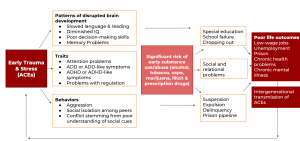
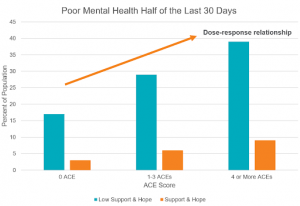
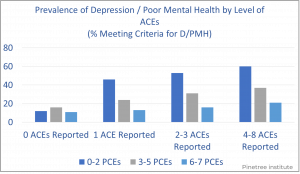
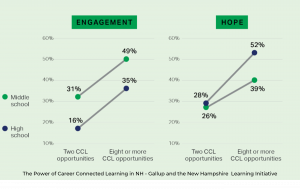
 Much of the information in this blog is from the author’s training as an Adverse Childhood Experiences Master Trainer through ACE Interface with Dr. Robert Anda and Laura Porter and through her volunteer work within the community mental health space.
Much of the information in this blog is from the author’s training as an Adverse Childhood Experiences Master Trainer through ACE Interface with Dr. Robert Anda and Laura Porter and through her volunteer work within the community mental health space.




 Once you’ve done your research and understand the job landscape in your area, it’s time to share that information and vision with your fellow educators, administrators, and Departments of Education. Gather testimonials from your past learners. Talk to employers in your community about learners they’ve worked with. Find ways to get others on board and see the impact of CTE in your school, district, and state.
Once you’ve done your research and understand the job landscape in your area, it’s time to share that information and vision with your fellow educators, administrators, and Departments of Education. Gather testimonials from your past learners. Talk to employers in your community about learners they’ve worked with. Find ways to get others on board and see the impact of CTE in your school, district, and state.  As a State CTE leader, you’re responsible for ensuring that essential information is properly collected, stored, and communicated to relevant agencies. However, many educators find data management difficult and time-consuming.
As a State CTE leader, you’re responsible for ensuring that essential information is properly collected, stored, and communicated to relevant agencies. However, many educators find data management difficult and time-consuming.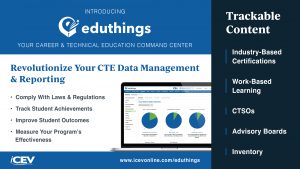
 Some states focus on a broad strokes approach that expands access to the sector as a whole. Last year,
Some states focus on a broad strokes approach that expands access to the sector as a whole. Last year,  Other states developed more focused career-specific pathways in close collaboration with industry partners.
Other states developed more focused career-specific pathways in close collaboration with industry partners. 


 In the constantly evolving education landscape,
In the constantly evolving education landscape,